Russian officials call for harsh punishment for perpetrators of concert attack
More than 130 people were killed in the attack.

Calls mounted on Monday to harshly punish those behind the Russia concert hall attack that killed more than 130 people.
Authorities continued to comb the burned-out ruins of the shopping and entertainment complex for more bodies.
Four men, charged with carrying out a terrorist attack, appeared in court on Sunday night and showed signs of being severely beaten.
Russia’s Prime Minister Mikhail Mishustin said the investigation is still ongoing but vowed that “the perpetrators will be punished, they do not deserve mercy.”
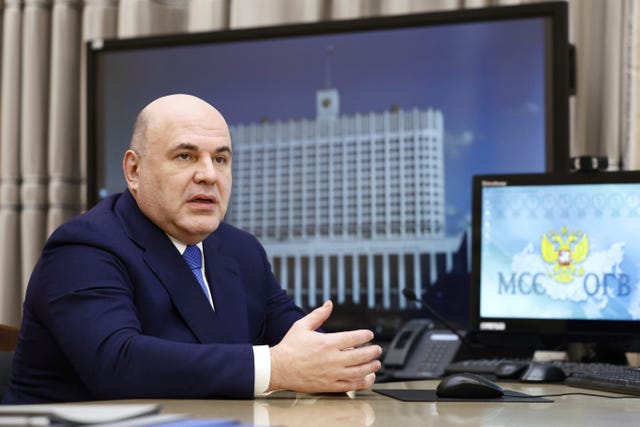
The attack Friday night on Crocus City Hall on the western outskirts of Moscow left 137 people dead and more than 180 injured, proving to be the deadliest in Russia in years.
A total of 97 people remained in hospital, officials said.
As they mowed down concertgoers with gunfire, the attackers set fire to the vast concert hall, and the resulting blaze caused the roof to collapse.
The search operation will continue until at least Tuesday afternoon, officials said.
An affiliate of the Islamic State group claimed responsibility for the attack, and US intelligence backed up their claims.
But Kremlin spokesman Dmitry Peskov refused to assign blame, urging reporters to wait for the results of the investigation in Russia.
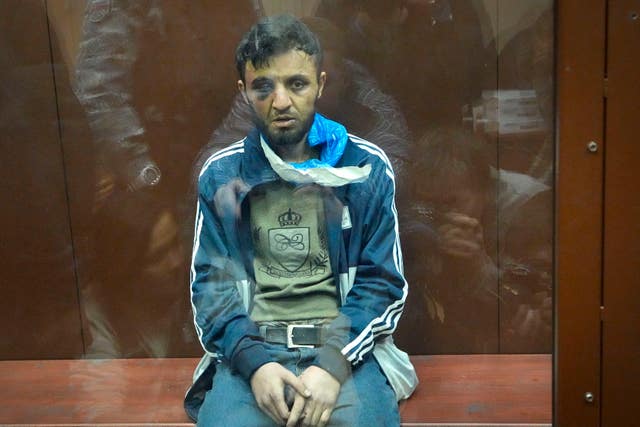
The four suspects were identified in the Russian media as Tajik nationals.
At least two of the suspects admitted culpability, court officials said, although their conditions raised questions about whether their statements were coerced.
The men were identified as Dalerdzhon Mirzoyev, 32; Saidakrami Rachabalizoda, 30; Shamsidin Fariduni, 25; and Mukhammadsobir Faizov, 19.
The charges carry a maximum sentence of life imprisonment.
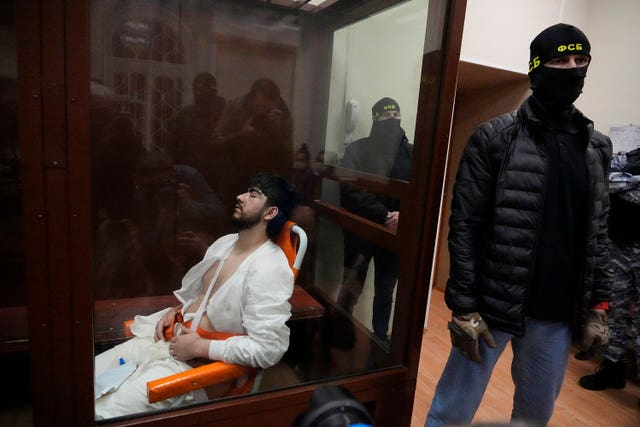
Russian media had reported the four were tortured during interrogation.
Mirzoyev, Rachabalizoda and Fariduni showed signs of heavy bruising, including swollen faces.
Mirzoyev had a plastic bag still hanging over his neck and Rachabalizoda had a heavily bandaged ear. Russian media reported Saturday that one suspect had his ear cut off during interrogation, however, this claim could not be verified.
The fourth suspect, Faizov, appeared in court in a wheelchair and sat with his eyes closed throughout.
He was attended by medical personnel in court, where he wore a hospital gown and appeared to have multiple cuts.
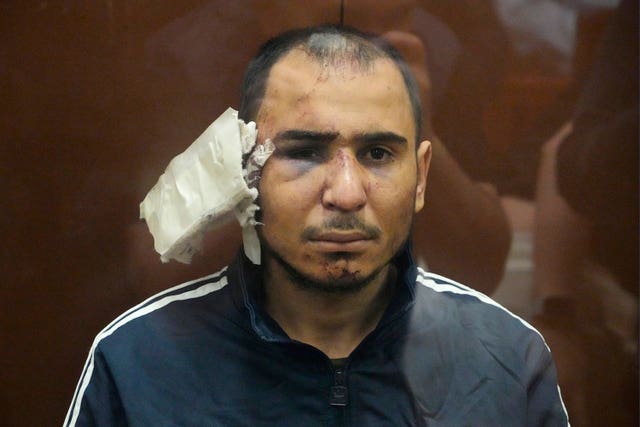
Mr Medvedev, Russia’s president from 2008 to 2012, had especially harsh comments about the suspects.
“They have been caught. Kudos to all who were chasing them. Should they be killed? They should. And it will happen,” he wrote on his Telegram page.
“But it is more important to kill everyone involved. Everyone. Those who paid, those who sympathised, those who helped. Kill them all.”
Margarita Simonyan, head of the state-funded television channel RT, shared photos of the four men’s bruised and swollen faces on X, formerly Twitter.
She said that even the death penalty — currently banned in Russia — would be “too easy” a punishment.
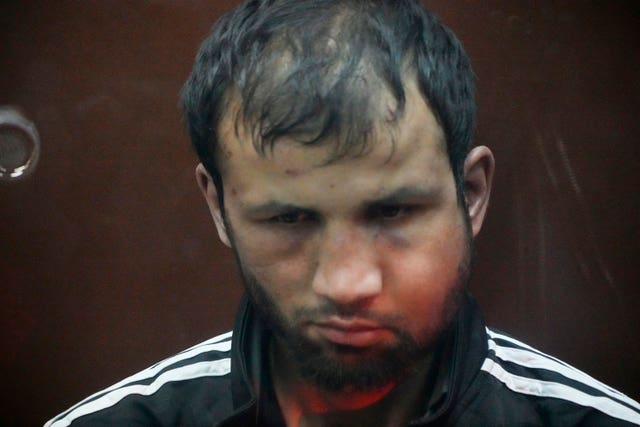
Opposition activists and human rights advocates noted “demonstrative cruelty” toward the men.
Sergei Davidis, of the Memorial human rights group, said abuse of suspects by law enforcement and security services is not new.
“We know about the torture of Ukrainian prisoners of war, we know about mass torture of those charged with terrorism, high treason and other crimes, especially those investigated by the Federal Security Service. Here, it was for the first time made public,” Mr Davidis said.
“They decided that this time there are no reasons to conceal their methods,” he said, adding, “It is a bad sign.”
Anastasia Burakova, a lawyer and founder of the Kovcheg group, which helps Russians who fled abroad, echoed Mr Davidis’ sentiment, writing on X: “From these days on, torture entered the public sphere and ceased to be an unspoken practice.”
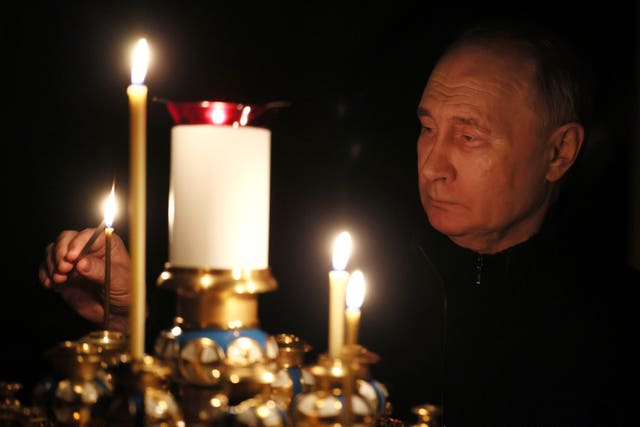
Some commentators on Russian social media questioned how authorities, who have relentlessly suppressed any opposition activities and prosecuted critics, failed to prevent the attack despite the US warning.
IS, which fought Russian forces that intervened in the Syrian civil war, has long targeted the country.
In a statement posted by the group’s Aamaq news agency, the IS Afghanistan affiliate said it carried out an attack in Krasnogorsk, the suburb of Moscow where the concert hall is located.
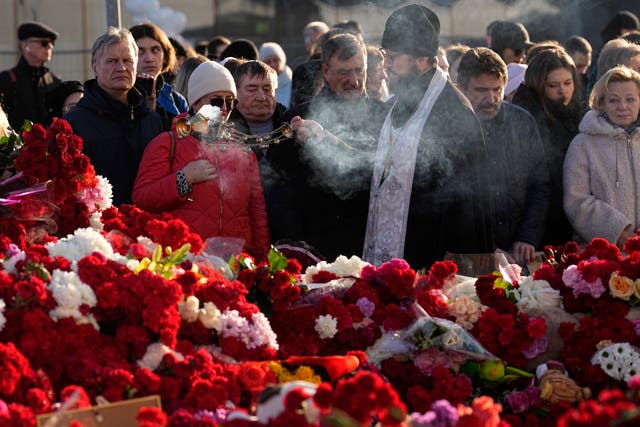
The group, which operates mainly in Syria and Iraq but also in Afghanistan and Africa, has claimed responsibility for several attacks in Russia’s volatile Caucasus and other regions in past years.
It recruited fighters from Russia and other parts of the former Soviet Union.





